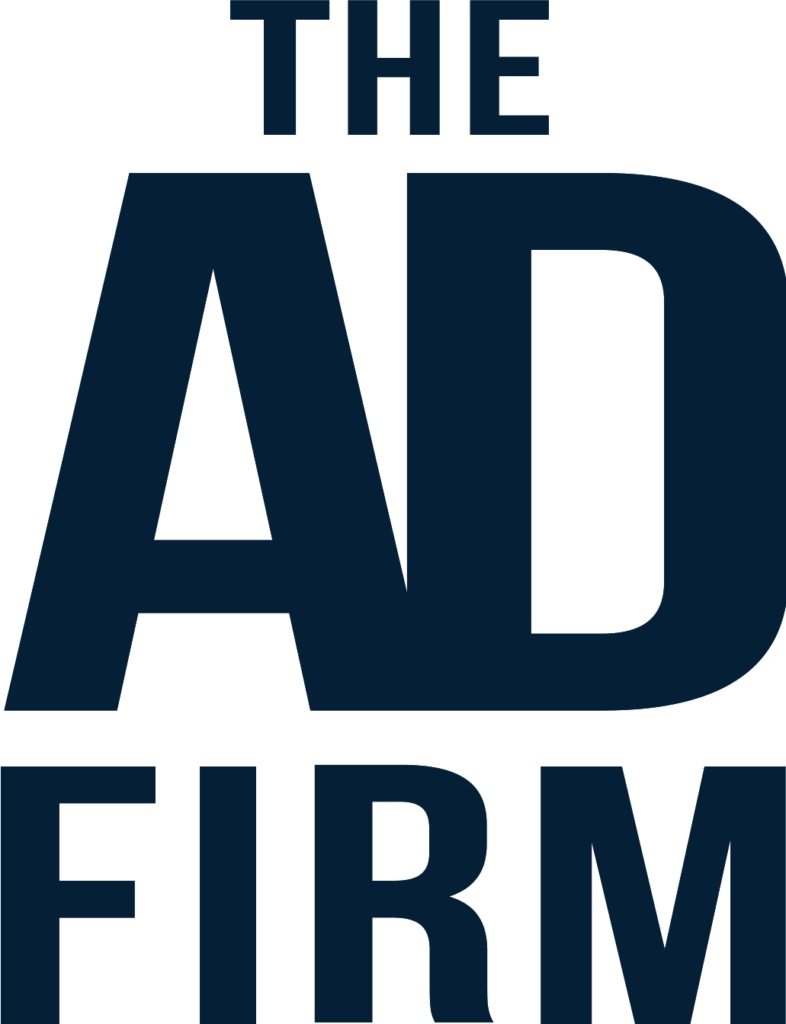In 2024, AI SEO tools have taken center stage, helping marketers, bloggers, and business owners streamline their SEO efforts and see better results faster. If you’ve been frustrated by the time-consuming tasks of researching keywords, creating optimized content, or running technical audits, AI tools can offer much-needed relief. This guide will take you through the top AI SEO tools of 2025, how they work, and how you can use them to improve your site’s performance. Ready to take control of your SEO and make it more efficient? Let’s get started.
What is AI SEO?
AI SEO is about integrating artificial intelligence into your SEO strategy to automate and enhance various processes. These AI tools can analyze large amounts of data, identify patterns, and suggest ways to improve your website’s performance in search results. What used to take hours of manual work, such as keyword research, content creation, and site audits, can now be done in a fraction of the time with the help of AI. By allowing AI to take over repetitive tasks, you can focus more on strategy, creativity, and making informed decisions.
How AI is Transforming SEO Practices
AI is revolutionizing SEO by simplifying and optimizing tasks that would otherwise require significant manual effort. For instance, keyword research, which used to involve hours of poring over data, can now be automated using AI tools that suggest relevant keywords based on real-time search data.
Here are a few ways AI is transforming SEO:
- Keyword Research: AI tools analyze current trends, search volumes, and user intent to provide a list of optimized keywords that are more likely to boost rankings.
- Content Generation: AI-powered tools can generate high-quality content outlines and even drafts, cutting down the time it takes to create SEO-optimized blog posts or landing pages.
- SEO Audits: AI tools can automatically scan your site for technical issues like broken links, slow page loading times, and missing meta tags. They even offer suggestions on how to fix these problems.
- User Experience Optimization: AI can analyze user behavior, such as time spent on pages and bounce rates, to suggest changes that can improve site engagement and rankings.
How to Use AI for SEO
Using AI for SEO can take your strategy to the next level by automating some of the more repetitive tasks while offering smarter, data-driven insights. Here’s how you can incorporate AI into your SEO process to maximize results:
- Brainstorm Topics Based on Your Audience: AI tools analyze user data and trends to help you generate content ideas that resonate with your target audience.
- Monitor Search Data: With AI, you can keep track of search trends and see how they shift over time. This helps you stay ahead of the competition and adjust your content strategy accordingly.
- Find Keywords Based on Your Topics: AI tools can suggest relevant, high-performing keywords based on the topics you’re already interested in covering.
- Speed Up the Research Process: AI drastically reduces the time it takes to gather research and competitive analysis for your content, allowing you to focus on crafting the best possible article or post.
- Generate Content Outlines: AI can create detailed content outlines based on search data and top-performing pages in your niche, ensuring you cover all the relevant points.
- Optimize Existing Content: Use AI tools to analyze current content and find opportunities for improvement, whether that’s adding more keywords, optimizing for readability, or improving user engagement.
- Track Key Performance Indicators (KPIs): AI tools can monitor important metrics like page views, clicks, and bounce rates, providing you with actionable insights to improve your content’s performance.
- Generate Structured Data: AI can help generate schema markup to improve your site’s visibility in search engines by making your content easier to understand for crawlers.
- Find Link-Building Opportunities: AI tools can help identify high-quality sites where you can build backlinks, boosting your site’s authority and rankings.
- Detect and Fix Technical Issues: AI tools can automatically find and fix technical problems, such as broken links, slow load times, or missing metadata, ensuring your site is always optimized for search engines.
Why Use AI Tools for SEO?
AI tools aren’t just a fad—they’ve become essential for anyone serious about improving their SEO game. They save time, improve accuracy, and provide insights that would be nearly impossible to gather manually. From optimizing content to finding the right keywords, AI can handle a wide variety of SEO tasks, making your strategy more effective and efficient. If you’re looking to scale your efforts without increasing your workload, AI SEO tools can be the key to doing more with less effort.
Efficiency and Time Savings
One of the biggest advantages of AI SEO tools is how much time they can save you. Traditional SEO tasks like keyword research, content creation, and site audits can take hours or even days if done manually. AI tools, on the other hand, can complete these tasks in minutes. Studies show that marketers using AI can save up to 12.5 hours per week. That’s more than 600 hours a year—time you can reinvest into more strategic initiatives or creative projects. If you’re running a business or managing multiple sites, AI tools free up valuable time so you can focus on what really matters.
Enhanced Accuracy and Data Processing
AI tools don’t just save time; they also improve accuracy. When dealing with vast amounts of data—like search volumes, user behavior, and competitor analysis—it’s easy for human error to creep in. AI tools are designed to process large datasets quickly and without mistakes. By analyzing trends and patterns that might not be immediately obvious to the human eye, AI can uncover valuable insights and opportunities for optimization. This kind of precision allows you to fine-tune your strategy based on real data, rather than guesswork, resulting in better rankings and more targeted content.
Personalization and SEO Strategy Customization
AI SEO tools allow you to tailor your strategy in ways that weren’t possible before. Rather than using a one-size-fits-all approach, AI can analyze your specific audience and site performance to offer personalized recommendations.
For instance, AI can suggest which keywords will perform best for your niche or which types of content your audience engages with the most. This level of customization ensures that your SEO strategy is as effective as possible, targeting the right people with the right content. Plus, AI tools can adapt as your audience and market change, keeping your strategy agile and responsive.
Evaluating AI SEO Tools
With so many AI SEO tools on the market, how do you choose the right one for your needs? The key is to look for tools that offer a combination of features that align with your specific goals. Whether you’re focused on content creation, technical SEO, or keyword research, you’ll want to ensure the tool you choose is designed to meet those needs. Evaluating AI SEO tools isn’t just about picking the most popular option—it’s about finding the tool that fits your workflow, offers reliable support, and has the features you need to succeed.
Key Features to Look for in AI SEO Tools
When you’re evaluating AI SEO tools, there are several key features you should look for to ensure you’re getting the most value for your investment:
- Natural Language Processing (NLP): This allows the tool to understand and generate human-like content. It’s especially useful for content creation and optimization, ensuring your articles sound natural and are aligned with user intent.
- Integration Capabilities: The tool should be able to seamlessly integrate with other platforms you use, like Google Analytics, WordPress, or your CRM, to provide a more holistic view of your SEO performance.
- User Support and Development: Look for tools that offer regular updates and improvements. The best AI tools are constantly evolving, and having a responsive support team ensures you’ll get help when you need it.
How These AI Tools Were Tested
To ensure the AI SEO tools mentioned in this guide are truly effective, they were tested based on several important criteria:
- AI Capabilities: Tools were evaluated on whether they use true AI technologies like machine learning and NLP, rather than just simple rule-based systems.
- Specialization: Each tool was tested on how well it handles specific SEO tasks, whether it’s content creation, keyword research, or site audits.
- Integration: The ease with which the tool integrates with other platforms and tools you might already be using was also taken into account, ensuring a smooth workflow.
Comprehensive Review of Top AI SEO Tools
When it comes to choosing the right AI SEO tool, it’s essential to consider which tasks you need help with. Some tools excel at content creation, while others are designed for technical SEO or keyword research. Below is a comprehensive review of the best AI SEO tools available in 2024 and 2025, categorized by their primary functions. Whether you need help generating content, optimizing your site’s technical aspects, or planning your keyword strategy, these tools have you covered.
Tools for Content Creation and Optimization
Content creation is one of the most time-consuming aspects of SEO. However, AI tools can make this process much faster and more efficient by helping with everything from brainstorming ideas to writing entire blog posts. Here are the top AI SEO tools for content creation and generative engine optimization.
HubSpot AI Tools
Price: Create a bundle to get a quote.
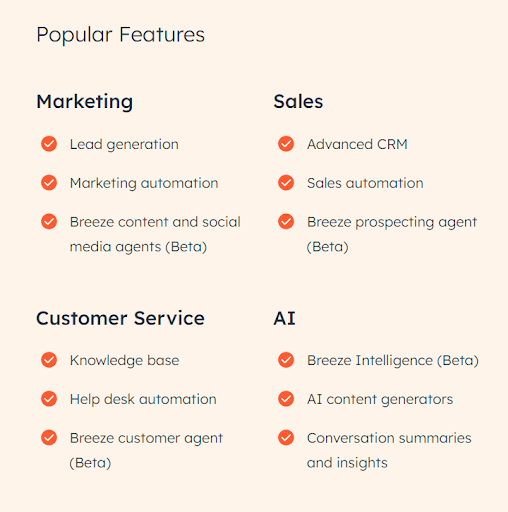
HubSpot offers a suite of AI-powered tools that help you create and optimize content with ease. From generating blog ideas to writing SEO-friendly copy, HubSpot’s AI tools are designed to assist both beginners and seasoned marketers. The platform also integrates seamlessly with its CRM, so you can track how your content performs and optimize accordingly. One of the standout features is the AI-driven SEO suggestions, which analyze your existing content and provide actionable recommendations for improvement.
Whether you’re creating a blog post or writing landing page copy, HubSpot’s AI tools ensure that your content is not only engaging but also optimized for search engines. The platform is particularly useful for those looking to improve their content marketing strategies without spending hours on manual optimizations.
INK
Price: Starts at $39 per month.
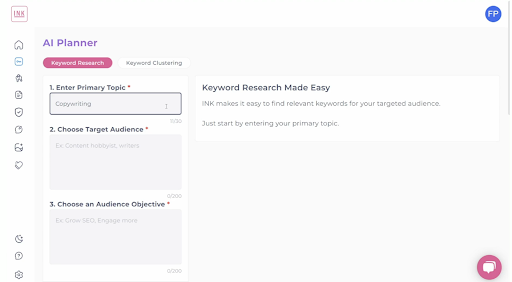
INK is a fantastic AI tool that focuses on helping you create content that not only ranks but also resonates with your audience. Its real-time optimization suggestions guide you through writing content that meets SEO best practices. One of the standout features of INK is its ability to provide you with an overall content score, which reflects how well your content is optimized for search engines.
It’s like having an SEO coach looking over your shoulder, providing suggestions on keyword placement, sentence structure, and readability. The tool also integrates seamlessly with WordPress, making it easy to implement changes directly from the platform.
Frase
Price: Starts at $15 per month
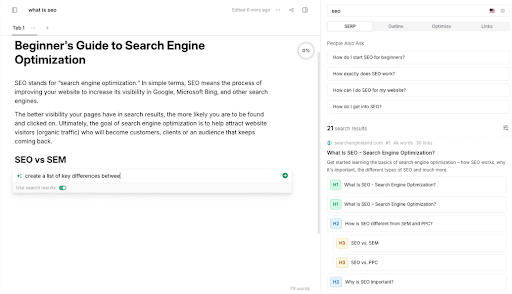
Frase is a powerful AI tool for content research and creation. It helps you draft comprehensive articles by analyzing the top-performing pages for a given keyword. This allows you to see what your competitors are doing right and use that information to structure your own content. With Frase, you can easily create content briefs, optimize existing posts, and even get AI-generated answers to frequently asked questions (FAQs).
It’s especially helpful for producing well-researched, long-form content that ranks well on search engines. Frase’s AI capabilities allow you to cover all the important topics that users are searching for, ensuring that your content stands out in a crowded market.
Jasper
Price: Starts at $49 per month (per user)
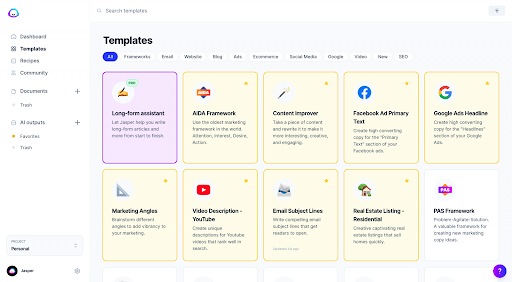
Jasper is one of the most advanced AI writing tools available, and it’s perfect for creating long-form content like blog posts, articles, and even ebooks. Jasper uses AI to generate SEO-optimized text that reads naturally and follows your specific guidelines. You can provide Jasper with a brief or outline, and the tool will fill in the rest with well-written, relevant content.
Jasper is particularly useful if you need to produce a lot of content in a short amount of time but still want to maintain a high standard of quality. It’s great for generating creative ideas, writing drafts, or even completing entire articles that are ready to be published.
MarketMuse
Price: Starts at $149 per month
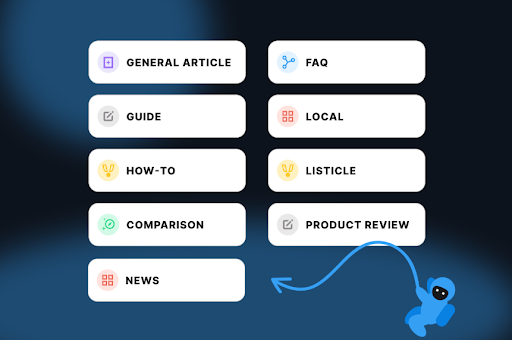
MarketMuse focuses on content strategy and optimization, using AI to help you create high-quality content that ranks. This tool analyzes your existing content to find gaps, suggesting topics that you should cover to increase your site’s authority. It also helps you create comprehensive content briefs, ensuring that your articles address all the relevant subtopics and keywords. MarketMuse is ideal for businesses or marketers looking to build topical authority and rank for more competitive terms. It even offers insights into how often you should update your content and what improvements you can make to boost its search performance.
READ ALSO: Is AI Content Good Enough for Google?
Tools for Technical SEO and Site Optimization
While content is crucial, technical SEO is just as important when it comes to improving your rankings. AI tools for technical SEO focus on optimizing your site’s performance, from page speed to fixing errors that could hurt your visibility. Here are the top AI SEO tools for technical site optimization.
AlliAI
Price: Starts at $299 per month
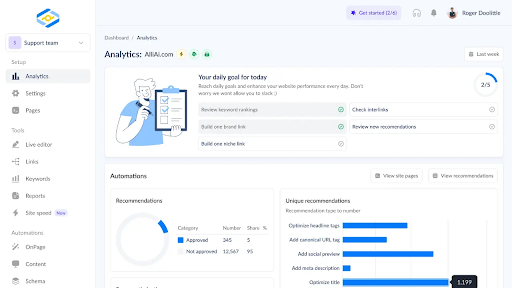
AlliAI is an AI-powered SEO tool that focuses on technical SEO optimization. It helps automate a wide range of on-page SEO tasks, from adding schema markup to fixing broken links. One of its standout features is the ability to bulk-apply SEO fixes across your entire site with just a few clicks, making it a great choice for large websites or e-commerce stores.
AlliAI also provides actionable recommendations for improving page speed, optimizing meta descriptions, and fixing any other technical issues that could be impacting your search rankings. If you’re looking to streamline the technical side of SEO, AlliAI is an excellent tool to consider.
NitroPack
Price: Starts at $21 per month
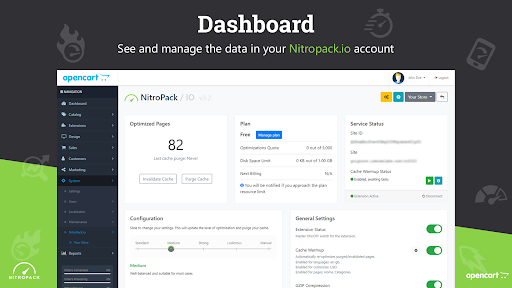
Site speed is a crucial ranking factor, and NitroPack is a tool that focuses on optimizing your website’s performance. It uses AI to compress images, optimize code, and improve loading times without compromising the quality of your content. NitroPack’s AI-powered optimizations ensure that your site is running as fast as possible, which not only improves your rankings but also enhances user experience.
The tool is particularly useful for websites with a lot of visual content, such as e-commerce stores or portfolios. A faster website means lower bounce rates, higher engagement, and ultimately better search rankings.
SE Ranking
Price: $65 per month
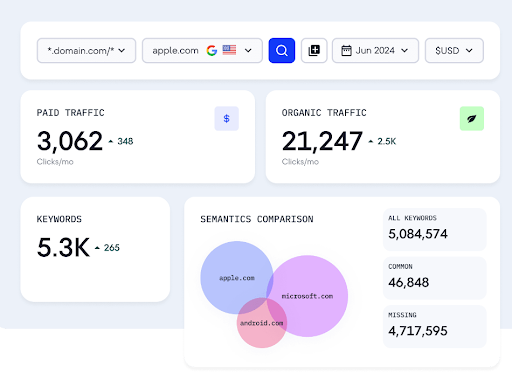
SE Ranking is an all-in-one SEO platform that includes a robust set of tools for technical SEO. It provides detailed site audits that highlight any technical issues, such as crawl errors, broken links, or duplicate content. SE Ranking also offers recommendations for fixing these issues, making it easier for you to optimize your site’s technical performance.
The platform’s rank-tracking feature allows you to monitor your search engine positions over time and see how your optimizations are affecting your rankings. SE Ranking is perfect for agencies or businesses managing multiple websites, as it offers comprehensive reporting and an easy-to-use interface.
Tools for Keyword Research and Content Planning
Keyword research is the backbone of any successful SEO strategy. AI tools for keyword research take the guesswork out of finding the right keywords by analyzing search data and suggesting terms that are both relevant and achievable. Here are the top AI tools for keyword research and content planning.
RankIQ
Price: $99 per month

RankIQ is designed to help bloggers and content creators find low-competition, high-traffic keywords. It’s perfect for those who are looking to target keywords that have a high chance of ranking but aren’t oversaturated by competitors. RankIQ provides a curated list of keywords for your niche, complete with a keyword difficulty score and suggested word count for blog posts.
It also helps you optimize your content by suggesting the best phrases and topics to include. With RankIQ, you can create blog posts that are not only optimized for SEO but also designed to rank faster and higher on Google.
NeuronWriter
Price: Starts at $23 per month
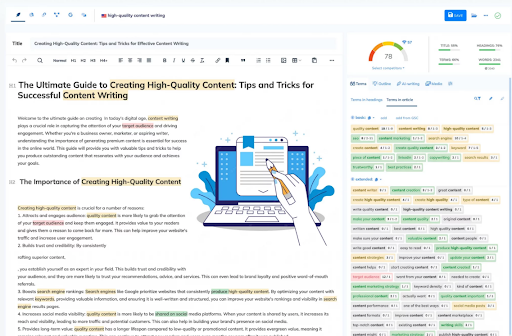
NeuronWriter is an AI tool that uses natural language processing (NLP) to analyze top-ranking pages and suggest the best keywords and content structure for your article. This tool is great for planning and writing content that matches search intent. NeuronWriter breaks down how your competitors are ranking and what you need to do to beat them, from optimizing keyword placement to adjusting your article structure.
It also provides detailed content briefs, helping you ensure that your content covers all the relevant subtopics needed to rank well. NeuronWriter is perfect for content marketers who want to streamline their keyword research and content planning process.
Surfer SEO
Price: $219 per month
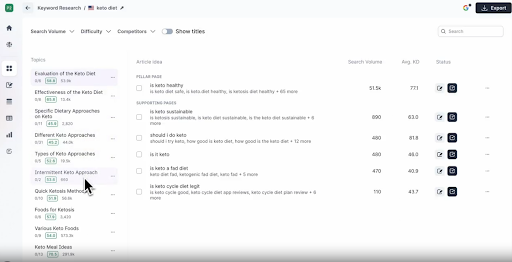
Surfer SEO is an AI-powered content planning tool that helps you optimize your content based on what’s currently ranking. It provides detailed keyword suggestions and analyzes your competitors to see what they’re doing right. Surfer SEO also offers real-time content optimization advice, guiding you on how to adjust your headings, keyword usage, and content length to improve your rankings.
One of the standout features of Surfer SEO is its ability to provide content score comparisons, allowing you to see how your content measures up against the competition. Whether you’re creating new content or optimizing existing posts, Surfer SEO gives you the insights you need to rank higher.
Free AI SEO Tools to Get Started
Not ready to invest in a paid AI SEO tool? Don’t worry—there are plenty of free options available that can still make a big difference in your SEO strategy. While they might not have all the advanced features of premium tools, free AI SEO tools are great for beginners or those on a budget. These tools can help you get started with keyword research, content optimization, and more without spending a dime.
While they often come with limitations, they offer enough functionality to help you improve your rankings without breaking the bank. Below are some of the best free AI tools to consider for SEO.
ChatGPT

ChatGPT is a versatile AI tool that can help with content generation, brainstorming, and even keyword research. While it’s not specifically designed for SEO, you can use it to generate blog post ideas, write content drafts, and find new angles for your topics. ChatGPT’s conversational abilities make it easy to interact with and get personalized responses to your SEO questions. If you’re looking for a free tool that can help with a variety of tasks, ChatGPT is worth exploring.
QuillBot AI
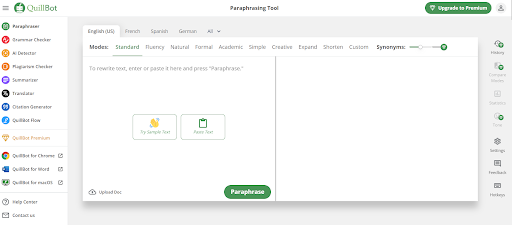
QuillBot AI is a great tool for paraphrasing and rewriting content. If you have existing blog posts or articles that need a refresh, QuillBot can help you rewrite them in a way that’s more engaging and SEO-friendly. It’s particularly useful for repurposing old content or updating posts to match current trends. The free version offers basic functionality, while the paid version unlocks more advanced features like summarization and plagiarism detection.
Perplexity AI
Perplexity AI is an AI-powered research tool that helps you gather information quickly. It’s great for content research, as it provides summaries and key insights from various sources on the web. You can use it to speed up the research process for your blog posts, articles, or landing pages. While it’s not a dedicated SEO tool, it can be incredibly useful for content creation, especially if you need to gather a lot of information in a short amount of time.
Limitations of Free Versions
While free AI SEO tools are great for getting started, they do come with limitations. Most free tools have restricted features, meaning you won’t get the full range of functionality that premium tools offer. For example, free versions may limit the number of keywords you can research, the amount of content you can optimize, or the number of audits you can run.
Additionally, free tools often don’t include advanced features like integration with other platforms, detailed reporting, or support for complex SEO tasks. If you’re serious about scaling your SEO efforts or handling larger projects, upgrading to a paid version may be necessary.
Premium versions of AI SEO tools unlock advanced features, allow for more comprehensive data analysis, and typically come with better customer support. While free tools can get you started, investing in a paid plan will give you the extra edge you need to compete more effectively.
Practical Tips for Integrating AI Tools into SEO Workflows
Integrating AI tools into your SEO workflow doesn’t have to be complicated, but there are some best practices to follow to make sure you’re getting the most out of these technologies. Here are practical tips for seamlessly incorporating AI into your existing SEO strategy:
- Start with Clear Goals: Before diving into AI tools, define what you want to achieve. Are you looking to improve keyword research, content creation, or technical audits? Knowing your goals will help you choose the right tools and use them effectively.
- Use AI to Automate Repetitive Tasks: One of the biggest advantages of AI tools is their ability to handle repetitive tasks like keyword research or technical audits. Let the AI do the heavy lifting so you can focus on more strategic aspects of your SEO, like planning and creativity.
- Combine AI with Human Expertise: While AI tools can provide valuable insights, they work best when combined with human oversight. Use AI to gather data and make suggestions, but apply your expertise when it comes to implementing strategies and making final decisions.
- Monitor and Adjust: SEO is not a set-it-and-forget-it process. Use AI tools to continuously monitor your SEO performance, track keyword rankings, and identify areas for improvement. Regularly adjusting your strategy based on AI insights will keep your SEO efforts agile and effective.
- Test and Experiment: Not all AI tools will work the same for every business. Don’t be afraid to test different tools, features, and strategies to see what works best for your specific needs.
By following these tips, you can seamlessly integrate AI tools into your SEO workflows and start seeing results without feeling overwhelmed.
READ ALSO: Is AI Content Considered Spam by Google?
Future Trends in AI SEO
The SEO landscape is always evolving, and AI is poised to play an even larger role in the coming years. As AI technology continues to advance, its applications in SEO will become more sophisticated, helping marketers stay ahead of the competition. Here’s what to expect from AI SEO in the future:
Predictions for AI in SEO
In the next few years, we can expect to see AI becoming even more integral to SEO strategies. Here are some key trends to watch out for:
- Smarter Search Algorithms: Search engines are constantly improving their algorithms, and AI is a big part of that. Expect search engines to become better at understanding user intent, which means your content will need to be even more relevant and optimized for what users are actually searching for.
- Increased Focus on User Experience: AI will continue to push SEO towards enhancing the user experience (UX). This includes everything from page speed and mobile optimization to how users interact with your content. AI tools will help you measure and improve UX metrics, which will play a bigger role in rankings.
- More Personalized Search Results: As AI gets better at understanding individual user behavior, search results will become more personalized. This means that SEO strategies will need to focus on creating highly relevant, personalized content to match the user’s needs and search history.
- Voice Search Optimization: With the rise of smart devices, voice search is becoming more popular, and AI will be crucial in optimizing content for voice queries. Tools will help you adapt your content to natural language processing, ensuring it ranks well in voice searches.
- Automated Content Creation: AI-driven content creation tools will continue to improve, making it easier to generate high-quality, SEO-friendly content at scale. While human oversight will always be necessary, AI will play a bigger role in streamlining the content creation process.
Keeping Up with AI Developments
To stay competitive in the SEO world, it’s important to keep up with the latest AI advancements. Here’s how you can stay informed:
- Follow Industry Blogs and News: SEO and AI are constantly evolving fields, so it’s important to stay updated. Follow trusted SEO blogs, AI newsletters, and industry experts on social media to stay in the loop about new tools and trends.
- Attend Webinars and Conferences: Many SEO experts and some of the best SEO company host webinars and conferences focused on AI and SEO. Attending these events is a great way to learn about the latest tools, strategies, and trends in the industry.
- Experiment with New Tools: Don’t be afraid to test out new AI SEO tools as they emerge. Keeping an open mind and experimenting with different features will help you find the best solutions for your SEO needs.
- Continuous Learning: AI and SEO are fields that are constantly changing, so make it a habit to invest in continuous learning. Whether it’s taking an online course or joining a professional community, staying educated will help you keep up with the pace of technological advancements.
By staying on top of AI developments, you’ll be able to adapt your SEO strategy to meet the changing demands of search engines and user behaviors.
Maximizing AI for SEO Success
The takeaway? AI is a fantastic tool for streamlining SEO tasks, generating ideas, and saving time, but it can’t replace the value of human experience and expertise. Skilled SEOs, content marketers, and editors are still crucial for creating content that meets high standards and aligns with Google’s E-E-A-T (Experience, Expertise, Authoritativeness, and Trustworthiness) guidelines.
Let AI assist with the heavy lifting, but always rely on human judgment to shape the strategy and make the final decisions. In the end, it’s the blend of AI efficiency and human creativity that leads to SEO success.


